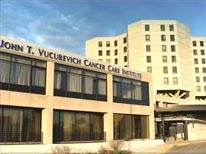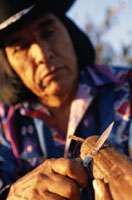
Radiation Research Program
Cancer Disparities Research Partnership Program
National Cancer Institute
Third Floor, Suite 3W220
9609 Medical Center Drive
Rockville, MD 20892
Rapid City Regional Hospital
Rapid City, SD

Rapid City Regional Hospital
Cancer Care Institute
353 Fairmont Boulevard
Rapid City, SD 57701
www.rcrh.org
Principal Investigator: Dr. Daniel Petereit
Rapid City Regional Hospital is a not-for-profit regional medical center operated in trust for the community and region by a 13-member Board of Trustees, who represents the local communities. It is licensed for 310 acute care and 56 psychiatric beds and is accredited by the Joint Commission on Accreditation of Health Care Organizations and the Commission for the Accreditation of Rehabilitation Facilities. Rapid City Regional Hospital offers an extensive array of services including but not limited to Comprehensive Cancer Care, Comprehensive Heart Care, Diagnostic Imaging and Home Health Extended Care.
Cancer Care Institute
The Cancer Care Institute (CCI) at RCRH is a technologically
advanced facility that has been continuously approved as a
comprehensive community hospital since 1981. The Comprehensive
Cancer Program includes medical oncology, radiation oncology,
clinical trial research, pharmacy, lab and imaging, quality
assurance, cancer registry, and home care/hospice. CCI maintains
long-standing relationships with nationally renowned research
groups and works with regional health care providers to promote
cancer awareness, prevention and early detection.
 Patient Population
Patient Population
RCRH serves approximately 100,000 Native Americans from surrounding
communities and reservations including Pine Ridge, Cheyenne River
and Rosebud. The Pine Ridge Reservation is currently the poorest
county in the United States and suffers from some of the highest
cancer mortality rates. Rapid City Regional Hospital is the primary
provider of radiation oncology care for the Native American Population
in this region.
Grant Staff Contact Information
Principal Investigator
Daniel Petereit, MD
Radiation Oncology
Phone: (605) 719-2305
Email: dpetereit@rcrh.org
Program Director
Shalini Kanekar, PhD
Phone (605) 719-2313
Email: skanekar@rcrh.org
Clinical Research Assistant/Office Coordinator
Kristin Cina
Phone: (605) 719-2305
Email: kcina@rcrh.org
Grants Administrator
Bill Kelly
Phone: (605) 719-2330
Email: wkelly@rcrh.org
Patient Navigators
Deb Brunette, RN
Phone: (605) 719-2316
Email: dbrunette@rcrh.org
Dave Koop, RN
Phone: (605) 719-2312
Email: dkoop@rcrh.org
Clinical Oncology Research Nurses
Amy Boylan, RN, BSHS
Phone: (605) 719-2325
Email: aboylan1@rcrh.org
Michele Sargent, RN
Phone: (605) 719-2341
Email: msargent@rcrh.org
Dave Koop, RN
Phone: (605) 719-2312
Email: dkoop@rcrh.org
Community Research Supervisor
Vanessa Short Bull (Rapid City)
Phone: (605) 719-2317
Email: vshortbull@rcrh.org
Community Research Representatives/Community Navigators
Raylene Miner (Cheyenne River Reservation)
Phone: (605) 391-6256
Email: rminer@rcrh.org
Caroline Spotted Tail (Rosebud River Reservation)
Phone: (605) 391-6257
Email: cspottedta@rcrh.org
David Rooks (Pine Ridge Reservation)
Phone: (605) 391-6587
Email: drooks@rcrh.org
Primary Partner Institution
University of Wisconsin Comprehensive Cancer Center
Department of Human Oncology
K4 Clinical Science Center
600 Highland Avenue
Madison, WI 53792
Contact Information
Co-Investigator
Amy Moser, PhD
Associate Professor
Phone: (608) 265-6520
Email: armoser@wisc.edu
Cancer Disparities Research Partnership Program Project Summary
Project Title: Enhancing Native American Participation in Radiation Therapy Trials.
The Cancer Care Institute (CCI) in Rapid City, South Dakota, serves approximately 100,000 Native Americans from surrounding reservations in South Dakota, North Dakota, Wyoming and Nebraska. Some patients live up to four hours from the cancer center. Identifying barriers, which prevent Native Americans from presenting with earlier stages of cancer, or in some circumstances not at all, are being investigated. A culturally responsive questionnaire is administered to randomly selected Native Americans on the reservation who do not have cancer. A second questionnaire is given to cancer patients, and address similar issues, but concentrate on additional questions of oncologic relevance. It is hypothesized that a major barrier is geographic dislocation from cultural/community roots close to home. Traditional radiotherapy involves a 6 to 8 week course and daily treatments. This treatment approach may represent a major barrier. With the use of advanced technologies such as intensity modulated radiotherapy and brachytherapy, the treatment course can be shortened to 1(delete "to 1") to 4 weeks. Therefore, to address this barrier, clinical trials have been developed which shorten treatment duration. A series of phase II studies are being conducted for malignancies commonly seen among the Native Americans: metastatic disease, non-small cell lung carcinoma (NSCLC), breast, prostate, and head and neck (H&N) cancer. For patients with stage I and II breast cancer, high-dose-rate (HDR) brachytherapy is being substituted for a conventional course of external beam radiation. Patients with advanced prostate cancer are being treated with a 2-week course of conformal external beam radiation followed by an HDR implant in combination with androgen ablation. Pilot tomotherapy trials are proposed for patients with metastatic disease, locally advanced H&N, and NSCLC. The final pilot trial will investigate the use of HDR brachytherapy alone for early stage prostate cancer. A genetic milieu may exist which renders Native Americans more sensitive to radiation. Therefore, a laboratory study is being conducted to investigate whether Native Americans have a higher mutation rate of the AT (ataxia-telangiectasia) gene determined through HPLC of the peripheral blood lymphocytes. Through patient education, screening, assessing potential barriers to health care, and innovative treatment strategies, it is hoped that Native Americans will eventually present earlier in their disease process.
Rapid City Regional Hospital's Native American Patient Navigator Program (NAPNP)
Programmatic Goals:
Diminish cancer incidence and mortality and to improve the quality of life of
people with cancer in the Native American community served by Rapid City Regional
Hospital. Rapid City Regional Hospital's Native American Patient Navigator Program
(NAPNP) will identify and assist potential cancer patients to obtain the most appropriate
diagnosis, treatment, and follow-up by helping patients navigate the health care
and insurance systems.
Due to the long distances patients must travel to receive treatment at Rapid City Regional Hospital, Dr. Petereit has designed a Patient Navigator Program to give patients immediate access to a CDRP representative. Dr. Petereit has hired Community Research Representatives to work on the reservations and assist the Patient Navigators who are located in Rapid City.
Patient Navigator Responsibilities:
- Determine the patient's primary language and arrange for a translator as needed;
- Ascertain patient's recent history in the health care system;
- Refer patients for test and explain results of tests;
- Review treatment recommendations;
- Discuss clinical protocol available;
- Help with Indian Health Services, Medicare or Medicaid paperwork;
- Facilitate interaction and communication with health care providers;
- Ensure patients have accurate and complete information by obtaining all pertinent information;
- Assist the patient and family with obtaining answers to any questions or concerns they have; and
- Develop and maintain a learning library of cancer related material appropriate for patients and the public.
Community Research Representatives Responsibilities:
- Conduct patient and public education about the Native American Patient Navigator Program;
- Conduct patient and public surveys on cancer related needs, attitudes and concerns;
- Communicate with Indian Health Service entities on the three reservation and in Rapid City to ensure their awareness of NAPNP and the need to refer patients as appropriate;
- Communicate with tribal entities on the three reservations to ensure their awareness of NAPNP;
- Assist in arrangements for appointments, transportation, lodging, and meals for patients traveling to receive health care;
- Follow-up with patients in the case of missed appointments; and
- Communicate with the Patient Navigators about, and on behalf of, patients in the program.
|
Contact Information Patient Navigator |
Community Research Representatives/Community Navigators Raylene Miner (Cheyenne River Reservation) Caroline Spotted Tail (Rosebud Reservation) David Rooks (Pine Ridge Reservation) |
Details of Rapid City Regional Hospital's Patient Navigator Program were taken from the Patient Navigator Plan entitled the "Native American Patient Navigator Program: A Program of the Rapid City Regional Hospital in conjunction with NIH Grant RFA-CA-02-002 'Enhancing Native American Participation in Radiation Therapy Trials'" submitted by Dr. Daniel Petereit. (January 31, 2003)


